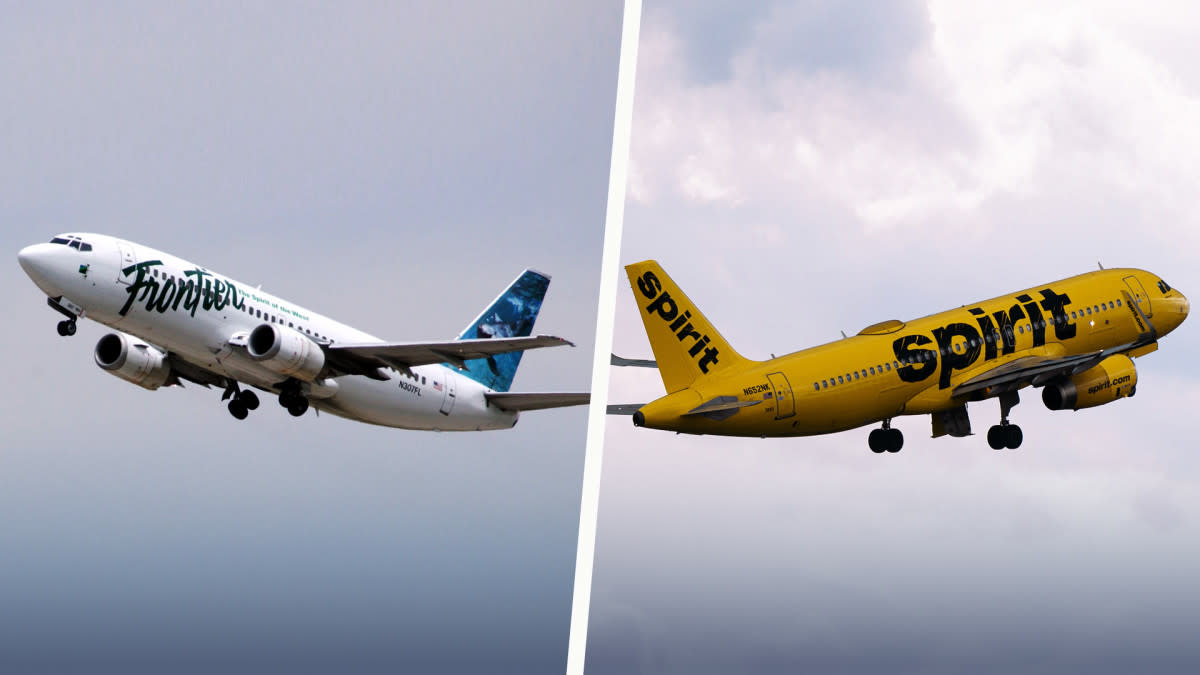After Spirit Airlines (SAVE) declared that it had filed for Chapter 11 protection last November, rumors about the low-cost airline’s future reached a fever pitch.
Stay ahead of the markets: Subscribe to TheStreet’s free daily newsletter
While the strong brand and loyal customer base make a full closure unlikely, the pool of investors who will be able to pull the struggling airline back on track is limited — and, now that Spirit has rejected a merger offer from Frontier (FRON) for a second time, got even smaller.

Spirit CEO Ted Christie peering over animated image of a Spirit airplane. The bankrupt airline has rejected an offer to combine with rival Frontier yet again.TheStreet Illustration
Why Spirit rejected Frontier’s offer, twice
The competing Denver-based low-cost airline first offered to buy Spirit Airlines in 2022 but was outbid by a $3.8 billion JetBlue (JBLU) deal. A federal judge ultimately blocked that agreement over antitrust concerns.
In January 2025, Frontier returned to the table, announcing it had “made a compelling proposal to combine with Spirit through the issuance of newly issued Frontier debt and common stock.”
Related: Investor calls out Spirit Airlines CEO’s pre-bankruptcy bonus
Spirit confirmed that the offer included $400 million in take-back debt and approximately 19% of Frontier shares to pay back Spirit creditors for a total of $2.1 billion.
The offer was a significant drop from the $580 million in take-back debt and 26.5% equity that Frontier reportedly offered Spirit in the summer of 2024 before Spirit’s bankruptcy announcement.
According to the airline’s executives, the offer was also insufficient because it presupposed that the $350 million in debtor-in-possession financing that Spirit requested to continue operations would be resolved before the deal was complete.
While backroom talks between the two airlines later led to an agreement not to make this a requirement and to waive a court-approved $35 million termination fee, Spirit was still dissatisfied with the total amount offered. Amid years of falling sales, it has accrued over $4 billion in debt, of which $1.1 billion was recently deferred.
Related: Frontier vs. Spirit: Which budget airline is better?
‘The new proposal would deliver less in value’ and be ‘materially more costly’, Spirit says
“The New Proposal would deliver less in value to the company’s stakeholders than contemplated by the company’s existing plan of reorganization, is uncertain as to timing and completion, would result in extended and materially more costly and uncertain chapter 11 proceedings, and has uncertainties with regard to needed regulatory and court approvals,” Spirit said in a statement.
Spirit also said that it submitted a counterproposal in which shareholders would get $600 million in debt and $1.185 billion in equity but Frontier ultimately rejected it and was in general unwilling to negotiate beyond what it had already agreed to.
More on travel:
“The Spirit Counterproposal proposed market-based mechanisms to determine the amount of the equity in the combined company equity proposed for Spirit stakeholders,” the airline said further.
With the two airlines at an impasse, Spirit rejected Frontier’s merger offer for the second, or third, time if you look back to the 2022 attempt. The immediate reorganization plan that Spirit proposed when it first filed for bankruptcy involved converting $795 million of debt into Spirit equity to shareholders. The immediate protections allowed it to defer the most looming debt deadlines.
In a statement on the rejected plan, Frontier said that it “remain[s] convinced” that a merged airline “would have created more value than Spirit’s standalone plan.”
Related: Veteran fund manager issues dire S&P 500 warning for 2025

